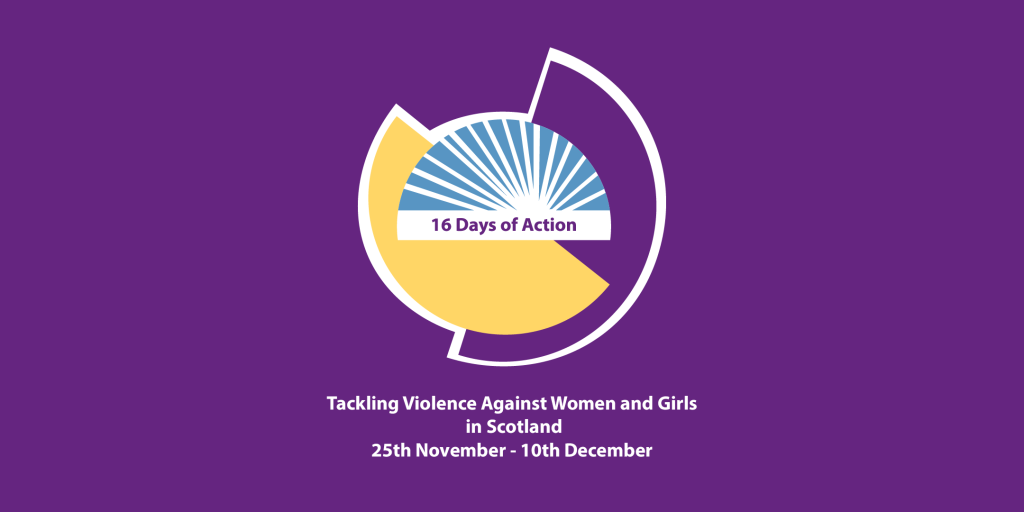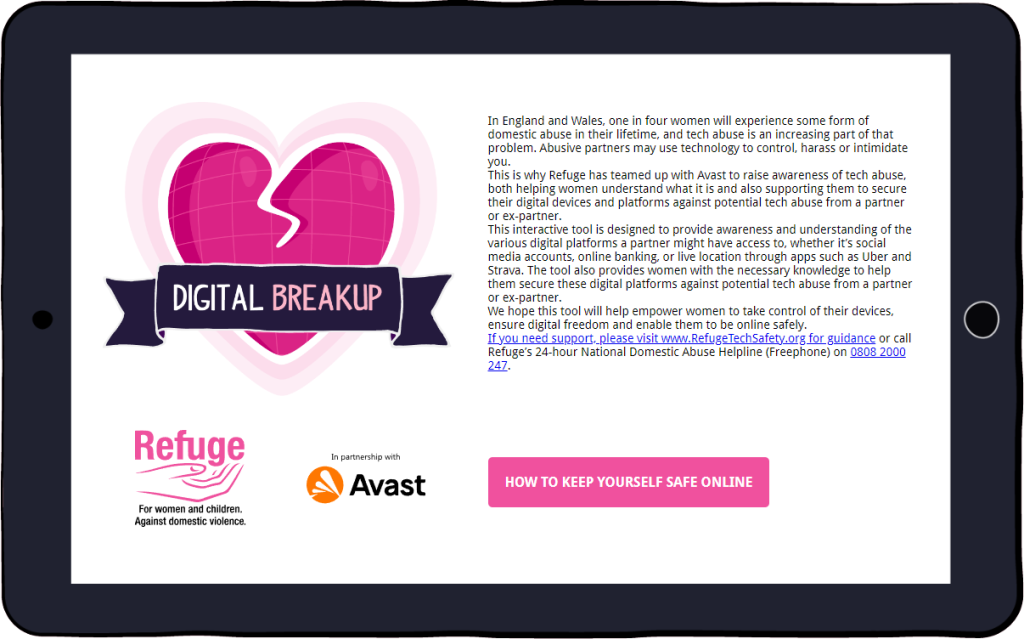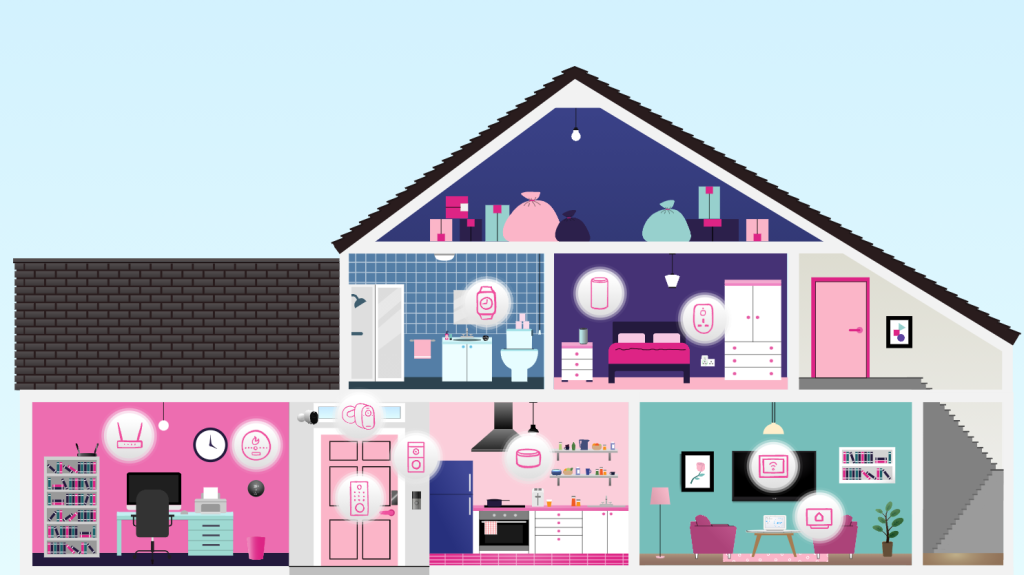As part of this years 16 days of Action, we are putting together a selection of blog posts to highlight support and issues. This post will look at online safety and ways to keep yourself safe.
What is tech abuse?
Anyone can experience tech abuse, by someone they know or by a complete stranger. Perpetrators may use technology to control, harass, monitor or intimidate you. They may even carry out physical, sexual, psychological, or economic abuse using technology. For example, they may hack your phone, cyberstalk you, or use social media, cameras, or other kinds of technology to try to harm or control you or your children.
The number of women and children experience tech abuse is rising every year. Many women experiencing tech abuse feel they have no choice but to stop using online spaces or their devices, which further heightens their isolation.
As the hackers and perpetrators get more advanced, so does tech they can use. It’s no longer just phones and tablets that can be used to communicate, watch or get information but now with smart toys, pet tech and the misuse of tracking devices. The, knowledge of how to keep yourself safe from tech is needed.
What can we do to protect ourselves online?
As well as creating strong passwords and being aware of what information we give out, there are some helpful tools to help keep you safe and think about some areas of tech you may not have considered.
Refuge have recently launched a website dedicated to tech safety and ways to keep yourself safer online. They cover cyberstalking, hacked emails and what to do if an ex partner has access to your accounts and devices.
You can try their digital break-up tool, this tool helps you review commonly used apps and guides you in making each platform more secure.
https://refugetechsafety.org/digitalbreakup/
There is also an interactive home, the home tech tool highlights commonly misused internet connected devices in the home and guides you on how to keep them secure.
https://refugetechsafety.org/hometech/
There are a number of other websites with information regarding online safety. As well as Refuge tech safety website, Safety Net Project is a dedicated website to keeping women who have experienced domestic abuse safe online. They have a toolkit for survivors focused on tech safety and privacy. This toolkit is very precise, it includes information on stalkware, smart cars and other smart tech you may not have considered such as smart pet devices.
Women shouldn’t feel they have to reduce their use of tech or have to delete their social media accounts and get rid of their smartphone. This is not only
unrealistic, it punishes the victim and cuts them off from their social and support networks, leaving them isolated. Instead, let’s use tech safely, smartly and take some simple steps to address potential vulnerabilities.
Dating Apps & Online dating
Meeting people online has become the norm, currently around 15 million UK singles are registered on dating sites and in fact – it’s how a quarter of couples met their other half. With so many different online dating options, millions of people to search through and so many horror stories, it’s really important that you know how to keep yourself safe on dating apps.
Different dating platforms attract different types of people due to their reputation. Some sites are known for being hook-up & affair sites, so if you’re looking for a serious relationship, these would be best avoided. Research before signing up and find out what the dating website is all about. Look to see if there are there lots of bad stories due to the nature of the site, and more importantly, what does the dating site do to keep you safe? The vast majority of people using dating apps, are there with good, honest intentions but it is worth being cautious about those who may have another purpose in mind.
No matter the dating app or its features, it’s important to keep in mind that any dating site has the potential for fake accounts. There are no apps that are truly able to verify the identity of its members, nor do they perform background checks. But you can do things on your own to make yourself safer.
One of the golden rules of online dating is don’t exchange personal information. This starts with the username you pick, avoid something that might give away information about you, such as your surname, age/year of birth. Second, until you’ve met and feel you can trust the person you’ve met online, don’t share your address, where you work /study, your phone number or email address. Check that the dating app you are using doesn’t share your location, you should avoid having information on your profile that would make it easy for a stranger to steal your identity or track you down in real life.
It’s safer to keep using the messaging function within the dating app or site until you feel you have met and can trust them. The dating messaging service is there for daters safety. Be wary of someone who wants to move the chat off the dating app or service shortly after meeting. If they ask for your number, or ask you to email them or switch to WhatsApp (a common trick among scammers is to say their subscription is running out), just politely decline and say it’s nothing personal, it’s just your policy not to.
Early declarations of love to someone you have never met is a common scammer technique. Dating services are a brilliant way of getting started, but be wary of those who profess love quickly via messages, or who message you constantly and at odd hours but always have an excuse as to why they can’t meet in person or over video message.
Just like when you meet someone face-to-face, your instincts will tell you if something’s not right. Maybe they won’t tell you much about themselves but ask you a ton of questions. If it feels weird, chances are it’s not what it seems. Trust your instincts and be cautious until you’ve had long enough to really get to know someone. And if you’re really not sure, run it by a friend that you trust to get some advice.
Don’t be afraid to report certain behaviour to the dating app you are using. If someone asks you for money, they’re almost certainly a scammer. They might tell you they need to buy a plane ticket, that they’re widowed, that their relative is sick or that they will give you something in return. Whatever the story, never give out your bank details or give someone money and if they ask, stop replying and report them immediately to protect both you and others from being scammed. You should also report someone if you feel sure you’re talking to someone who isn’t who they say they are, or if they’re threatening, offensive or insulting towards you.
Talking to someone should go at your pace and you should feel comfortable at all times.
How to get help…
There are many National support groups available to give you advice and guidance.
Women can call the National Domestic Abuse Freephone helpline on 0808 2000 247
Scottish Women’s Aid and LGBT domestic abuse in Scotland are excellent support group websites.
You can contact us on 01856 877900 or email us for advice at info@womensaidorkney.org.uk
If you or your children are in immediate danger, call the police on 999. If you can’t talk, call 999 followed by 55 to indicate you need help, but can’t talk.





